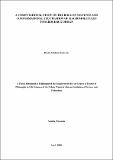| dc.description.abstract | Heat shock protein 90 (Hsp90) represents an important chemotherapeutic target in the treatment
of various ailments including cancer and neurodegenerative diseases. The protein is responsible
for controlling and regulating the growth of nearly 200 client proteins known to overexpress
in tumour or cancer cells. Targeting Hsp90 and inhibiting its chaperone machinery function
results in proteasome degradation of the client protein and hence treatment of the disease. In
this thesis, different computational docking protocols, the role of water and conformational
fluctuations in drug design for the discovery and identification of new Hsp90 inhibitors are
reported. In particular, the sensitivity of different docking protocols to crystal structure with
and without water, relaxed complex scheme (RCS) or ensemble-based structures holo and apo
structures with and without water, the effects of including a different amount of water in the
protein active site on the thermodynamics of ligand binding to protein structures are reported.
There is sensitivity of results to different docking protocols, RCS lowers the binding energy in
comparison to crystal structure, holo ensemble with strong ligand bound improves the docking
results. Since biological activities of small molecules highly depends on the conformation,
molecular structure, charge distribution and non-trivial response to solvents. The thesis further
explored the role of different solvents viz polar protic, polar aprotic, and non-polar on
the conformation of curcumin as a model drug/natural product. Well-tempered metadynamics
(WT-MetaD), an enhanced sampling method employing OPLS-AA force field in an isobaricisothermal
(NPT) ensemble was used to investigate the related solvent effects. The orientation
and conformational of curcumin was solvent dependent, the free energy for curcumin in solvents
and vacuum portrayed a different behaviour. Curcumin exists in different configuration
and conformations in different solvents. The trans-conformation was more stable in polar aprotic
solvents capable of solubilizing curcumin whereas the cis-conformation was more stable in
polar protic solvents i.e water where it has marginal solubility. Finally, the thesis reports on the
influence of solvents on kinetics and residence time of drug unbinding in host-guest complexes.
The effect of polar aprotic and polar protic solvents on kinetics and residence time of drug unbinding
from a nanoparticle was investigated using chitosan-toussantine-A as a model system.
WT-MetaD was used to study the kinetics and residence time. Results show that the kinetics
and residence time of drug unbinding was affected by solvents. Slow unbinding kinetics of
k
off
= 0.045 ms
1
was observed for the system formulated with water, a polar protic solvent,
while fast unbinding kinetics with k
off
= 1000 ms
1
was observed in system formulated with
DMSO solvent. Furthermore, the interaction of chitosan-toussantine-A complex in water was
observed to be stable than in DMSO. The approaches used in this thesis pave the ways and can
further be extended to investigate more problems in drug design ranging from protein-ligand
interaction, solution conformation of small molecules and host-guest kinetics. Since the new
reported small molecules as Hsp90 inhibitors are approved for other indication, the inhibitors
are recommended for further pre-clinical and clinical testing as new Hsp90 inhibitors for cancer
treatment. | en_US |


